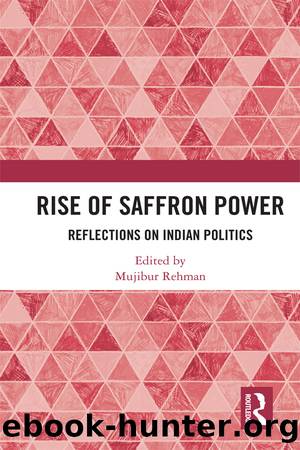Rise of Saffron Power: Reflections on Indian Politics by Mujibur Rehman

Author:Mujibur Rehman [Rehman, Mujibur]
Language: eng
Format: epub
ISBN: 9781138897274
Google: arBBswEACAAJ
Publisher: Routledge, Taylor & Francis Group
Published: 2018-11-15T00:02:40.183523+00:00
Implications for minorities
Since the Partition, collective violence against minorities has increased in frequency and intensity. With the rise of the saffron brigade, it has led to an immense loss of life and property, and always the weaker groups come off by far the worst. In 1992, the demolition of the Babri Masjid communal riots escalated across the country, reaching a climax with the pogrom of 2002 in Gujarat. Atrocities against Christians are frequent and far-flung: the Dangs in Gujarat, Kota in Rajasthan, Mangalore in Karnataka, and Kandhamal district in Odisha. To add to all this, random local attacks have only further escalated this politics of hate and revenge, of fear and mistrust.
The role of communal polarisation for electoral returns cannot be gainsaid (Berenschot 2011). Thus in 1984 the pogrom against the Sikhs that followed in the ground-shake after âa big treeâ fell helped Rajiv Gandhi to consolidate his hold on the party. The Shiv SenaâBPJ combine defeated the Congress in the election after the 1992â1993 riots in Mumbai. In 2002, the Godra incident provide an actionreaction sequence with the massacre of Muslims to establish the dominance of the BJP in the Gujarat and Modiâs pre-eminence in the party thereafter. The BJP has benefitted most by such inter-religious communal violence.
However, no party is above such a cynical use of communal violence when there are electoral returns to reap, for some the use of the communal card is more programmatic, like the BJP; for others it is more pragmatic, like the Congress. Thus Ashutosh Varshney finds that
Gujarat 2002 was different from Delhi 1984, only in that the Delhi violence was strategic, whereas the Gujarat pogrom were (sic) primarily ideological. Hindu nationalism is ideologically anti-Muslim, but Congress ideology has never been anti-Sikh.
(Varshney 2017)
Download
This site does not store any files on its server. We only index and link to content provided by other sites. Please contact the content providers to delete copyright contents if any and email us, we'll remove relevant links or contents immediately.
Machine Learning at Scale with H2O by Gregory Keys | David Whiting(4292)
Killers of the Flower Moon by David Grann(4039)
Oathbringer (The Stormlight Archive, Book 3) by Brandon Sanderson(3156)
Will by Will Smith(2908)
Once Upon a Broken Heart by Stephanie Garber(2845)
Guns, Germs and Steel by Diamond Jared(2365)
It Starts With Us (It Ends with Us #2) by Colleen Hoover(2341)
Borders by unknow(2303)
Friends, Lovers, and the Big Terrible Thing by Matthew Perry(2219)
The Room Where It Happened by John Bolton;(2151)
The Color of Law by Richard Rothstein(1935)
A Short History of War by Jeremy Black(1842)
The Strength In Our Scars by Bianca Sparacino(1840)
HBR's 10 Must Reads 2022 by Harvard Business Review(1839)
A Game of Thrones (The Illustrated Edition) by George R. R. Martin(1722)
Water Rights and the Environment in the United States by John Burch(1674)
515945210 by Unknown(1660)
Examples & Explanations: Administrative Law by William F. Funk & Richard H. Seamon(1641)
That Every Man Be Armed by Stephen P. Halbrook(1577)
